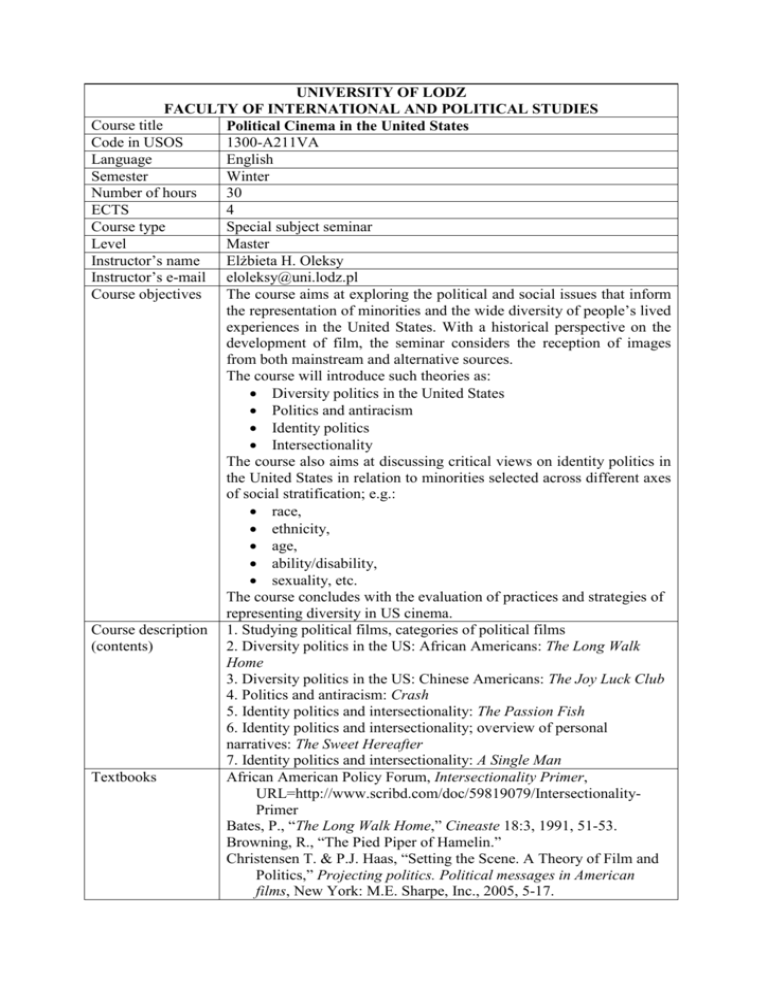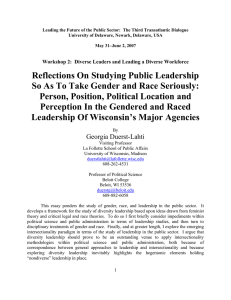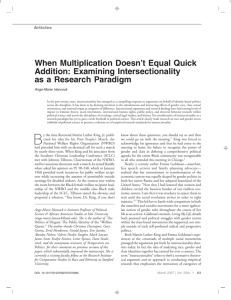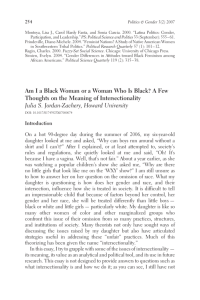UNIVERSITY OF LODZ FACULTY OF INTERNATIONAL AND
advertisement

UNIVERSITY OF LODZ FACULTY OF INTERNATIONAL AND POLITICAL STUDIES Course title Political Cinema in the United States Code in USOS 1300-A211VA Language English Semester Winter Number of hours 30 ECTS 4 Course type Special subject seminar Level Master Instructor’s name Elżbieta H. Oleksy Instructor’s e-mail eloleksy@uni.lodz.pl Course objectives The course aims at exploring the political and social issues that inform the representation of minorities and the wide diversity of people’s lived experiences in the United States. With a historical perspective on the development of film, the seminar considers the reception of images from both mainstream and alternative sources. The course will introduce such theories as: Diversity politics in the United States Politics and antiracism Identity politics Intersectionality The course also aims at discussing critical views on identity politics in the United States in relation to minorities selected across different axes of social stratification; e.g.: race, ethnicity, age, ability/disability, sexuality, etc. The course concludes with the evaluation of practices and strategies of representing diversity in US cinema. Course description 1. Studying political films, categories of political films (contents) 2. Diversity politics in the US: African Americans: The Long Walk Home 3. Diversity politics in the US: Chinese Americans: The Joy Luck Club 4. Politics and antiracism: Crash 5. Identity politics and intersectionality: The Passion Fish 6. Identity politics and intersectionality; overview of personal narratives: The Sweet Hereafter 7. Identity politics and intersectionality: A Single Man Textbooks African American Policy Forum, Intersectionality Primer, URL=http://www.scribd.com/doc/59819079/IntersectionalityPrimer Bates, P., “The Long Walk Home,” Cineaste 18:3, 1991, 51-53. Browning, R., “The Pied Piper of Hamelin.” Christensen T. & P.J. Haas, “Setting the Scene. A Theory of Film and Politics,” Projecting politics. Political messages in American films, New York: M.E. Sharpe, Inc., 2005, 5-17. Dillon, S., “Lyricism and Accident in The Sweet Hereafter,” Literature/Film Quarterly 31:3, 2003, 227-230. Johnston, T., “Sayles Talk – John Sayles in interview, on his most recent film Passion Fish and his career as director, writer, and actor,” Sight and Sound 3:9, 1993, 26-29. Kempf, A., “On the souls of white folks,” Crash politics and antiracism, ed. P.S.S. Howard& G.J. Sefa Dei, New York: Peter Lang, 2008, 91-101. Oleksy, E. H., “Intersectionality at the cross-roads,” Women’s Studies International Forum 34, 2011, 263-270. Oleksy, E. H., “Intricate interdependencies and female buddy movies,” Walking on a trail of words. Essays in honor of Agnieszka Salska, ed. J. Maszewska & Z. Maszewski, Łódź: Łódź Univ. Press, 2007, 345-56. Summerfield, E. & Lee, S. Seeing the big picture: A cinematic approach to understanding cultures in America, Ann Arbor: University of Michigan Press, 2006, ix-xvii; 27-89. Taubin, A., “A Single Man,” Film Comment 45:6, 2009, 68-69. Tibbetts, J., “A delicate balance: An interview with Wayne Wang about Joy Luck Club,” Literature Film Quarterly 22:1, 1994, 2-6. Walters, B., “The Trouble with Perfume,” Film Quarterly 63:4, 2010, 14-17. Assessment criteria developing students’ critical and creative skills in weekly journal assignments related to class discussions and readings throughout the semester (20%) class participation (20%) AND mid-term test (30%) final test (30%) OR personal narrative (60%)











